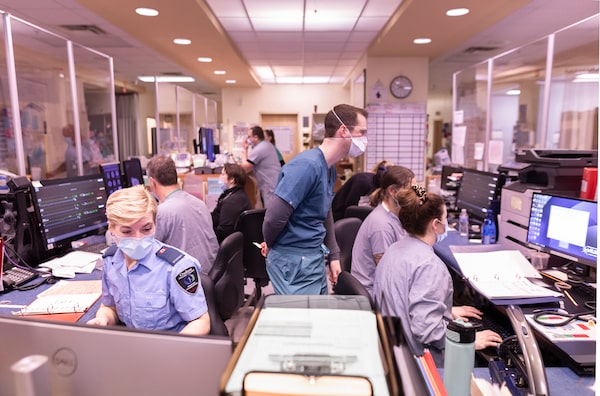
Emergency Department at Dr. Georges-L.-Dumont University Hospital Centre, in Moncton, N.B. in February, 2023.Daniel St Louis/Supplied
Newfoundland and Labrador Auditor-General Denise Hanrahan said Friday that she will investigate contracts between private vendors and the province’s health sector, citing The Globe and Mail’s reporting on expensive travel nursing deals.
In an e-mail, Ms. Hanrahan’s office said she would conduct a performance audit of “health sector contracts.” The scope of the review was intentionally defined broadly to give auditors wide latitude, Ms. Hanrahan said in an interview.
Performance audits, also known as value-for-money audits, assess how programs are managed and focus on their costs, efficiency and effectiveness.
In explaining her decision to launch the audit, Ms. Hanrahan said she is aware of The Globe’s reporting, and of concerns raised by Newfoundland politicians and interest groups about these contracts. “It certainly seemed like a topic that would be a complement to us, going forward,” she said.
The announcement arrives in the midst of an uproar in Newfoundland about the cost of travel nurses, who are hired from out of province by private, for-profit agencies. Those agencies then provide the nurses to the public health system at marked-up prices. The travel nursing industry has thrived across the country since the start of the pandemic, as health officials have relied on private providers to supplement short-staffed hospitals and nursing homes.
The Globe reported last month that one private agency, Toronto-based Canadian Health Labs, had inked contracts with health authorities in Newfoundland and New Brunswick, and charged rates that in many cases worked out to more than $300 an hour per nurse. That is roughly six times as much as nurses earn in the public health care system.
CHL also charged health authorities for meals for its nurses, but The Globe’s investigation found no evidence that the money had been distributed to the company’s workers. The Globe obtained copies of CHL’s employment contracts, which specified that the nurses were responsible for paying for their own food. More than two dozen nurses said they had never received meal allowances from the company.
Based on invoices obtained through freedom of information requests, The Globe initially calculated that CHL had billed Newfoundland for $1.6-million in meal allowances. Newfoundland and Labrador Health Services, the province’s health authority, confirmed to The Globe earlier this week that it had paid $2.12-million in these allowances as of December.
Ms. Hanrahan said it could be 12 to 18 months before a report on the audit is released. CHL’s current contract in the province, worth a maximum of $44.25-million, ends on April 30.
These nursing deals are already under scrutiny in Atlantic Canada. Late last month, Newfoundland Health Minister Tom Osborne asked the province’s Comptroller-General, who has oversight of the province’s finances, to review CHL’s contracts. The province’s Official Opposition has sent a letter to the RCMP, asking them to look into the contracts.
Earlier this month, New Brunswick Auditor-General Paul Martin announced a separate audit of travel-nursing arrangements in his province, where CHL has a contract worth as much as $93-million to supply nurses until 2026. It also has a $45-million deal to provide personal support workers there until May 31.
Yvette Coffey, president of the Registered Nurses’ Union of Newfoundland and Labrador, said her group had written several times to urge the Auditor-General to examine travel nursing. “There must be a full, open and transparent accounting for the money that the taxpayers of Newfoundland and Labrador spent on these private agencies,” Ms. Coffey said.
Newfoundland seeks answers after ‘shocking’ spending on temporary nurses
In a statement, Mr. Osborne, the Health Minister, said he is pleased that there will be an audit. He added that he had been in contact with Ms. Hanrahan about health care contracts.
Newfoundland and Labrador Health Services said in a statement that it “values the work of the Auditor-General and will work collaboratively with the Office as the review is conducted.”
CHL has not responded to past requests from The Globe for it to explain why its nurses claim they didn’t receive money for meals, despite the payments from health authorities. In response to past questions about that and other aspects of its business, the company issued a four-paragraph statement stating that its rates are “fair and transparent” and that its prices “reflect the extraordinary logistical challenges of getting and keeping health care professionals in rural, remote and underserved communities.”
The Globe contacted CHL’s lawyer, William McDowell, for comment about Ms. Hanrahan’s decision. The company offered no response.